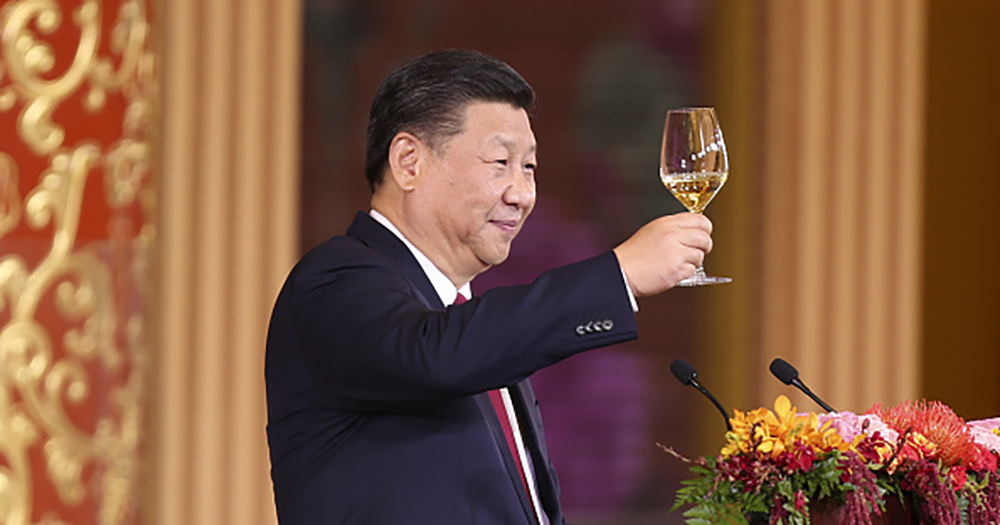President Xi Jinping has become China's most powerful leader.
He is set to become a leader for life after the ruling Communist Party scrapped term limits for the country's president and vice-president, effectively reversing a four-decade trend to ensure power could not continue to reside in one person's hands.
There is no longer a 10-year, two-term limit to a president's rule.
So, what does this mean for China moving forward?
1. Xi = Mao. Or greater?
With one move, Xi has effectively been given dominance over Chinese politics for possibly decades to come.
His status has been elevated to that of late paramount leaders, Mao Zedong and Deng Xiaoping, becoming China's third "core" leader.
In October 2017, a political theory with Xi's name was written into the party's revised constitution.
The theory is called “Xi Jinping Thought on Socialism with Chinese Characteristics for a New Era”, with the Communist Party exalting Xi as the greatest living theorist.
The label placed Xi’s ideology alongside “Mao Zedong Thought”, written into the party charter in 1945, and above the “Deng Xiaoping Theory”, which was added in 1997 after Deng’s death.
They called Xi's theory a new “guide to action.”
2. President as long as he lives
And now, the stage is set for him to become the greatest Chinese leader since Mao.
This means that 64-year-old Xi can rule as president beyond 2023.
Or for as long as he lives.
Mao himself ruled for more than three decades till his death in 1976.
Xi's status as a potential "leader for life" is not completely unexpected.
Since he took office in 2012, he has moved quickly to consolidate power and crush dissent.
But in him, China found stability for economic growth.
In the lead-up to the 19th Party Congress in 2017, there was intense speculation over whether Xi would continue to lead the party beyond two terms and if there was time for action to be enacted on plans he laid.
But this change has put to rest the speculation.
[related_story]
3. President is just a title
Theoretically, Xi does not need to rely on the title of president.
In Chinese politics, the role of president is largely ceremonial.
Real power resides in the hands of the general secretary and the chairman of The Central Military Commission.
Xi, however, holds all three positions.
President or not, it is clear that Xi's grip has tightened somewhat in a deal that is sealed.
It has been said that "raising the term limit is not too significant unless new power is attached to the title":
"So in the next five years, the president may be given more substantial power, and we are likely to see that in future constitutional amendments."
4. Succession still an issue in China
But this current strategy of keeping Xi for the long haul has highlighted that China, like the Soviet Union before it, has been unable to solve the issue of institutionalised succession.
According to the South China Morning Post, while China may have moved on from its violent legacy of bloody purges under Mao's dictatorship in the early decades of the People's Republic, leadership succession in China remains an extremely opaque and contentious process to this day.
Deng Xiaoping had sought to institutionalise peaceful transitions of power after 30 years of increasingly arbitrary rule under Mao.
Further improvements were made after Deng's death to make the succession process more institutionalised and less unpredictable.
The power transition from Jiang Zemin to Hu Jintao in 2002 was the first orderly and uneventful transition in Communist Party history, but it did not mean an end to power struggles between Jiang and Hu.
It is true that even democratic countries such as the United States has had issues with succession as well.
But it was largely resolved due to many attempts over the years -- like the 20th Amendment that shortens the time outgoing elected officials have a role in passing laws -- to make the transition period more likely to go well.
5. Lee Kuan Yew: Compared Xi to Nelson Mandela
Singapore's first prime minister Lee Kuan Yew had famously praised Xi as a man of "great breadth" after the two met in 2007, comparing him to Nelson Mandela:
"A person with enormous emotional stability who does not allow his personal misfortunes or sufferings affect his judgment.
In other words, he is impressive."
And perhaps for a great leader like Xi to realise his ambitious plans for the country, 10 years is simply not long enough.
Top image via Getty Images
If you like what you read, follow us on Facebook, Instagram, Twitter and Telegram to get the latest updates.
